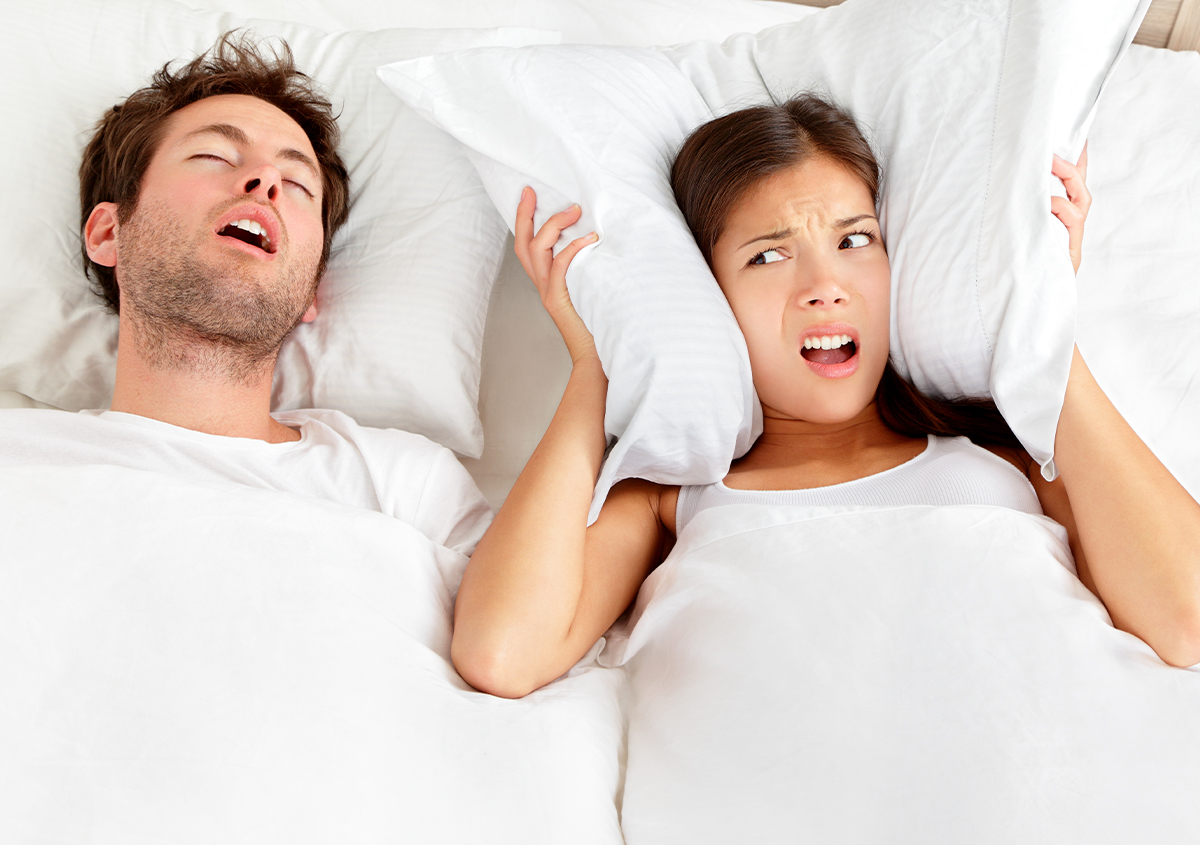Take action about Sleep Apnea a Serious disorder that requires prompt treatment
Our approach to sleep apnea fits in well with our range of other convenient, conservative, non-invasive, and stress-free dental services.
And, while sleep apnea care at a dentist’s office may seem curious at first blush, our dentists are in the best possible position to detect potential problems with breathing during sleep and to address those serious issues promptly and effectively. After all, they have considerable training and experience with oral anatomy and function. This expertise also plays a vital role in multi-disciplinary care, alongside specialists in sleep medicine or family physicians/general practitioners.
The trouble with sleep apnea
Sleep apnea is defined by interruptions in breathing when a patient is at rest. These interruptions can happen dozens of times each hour, night in and night out. When patients with apnea sleep, the tissues and muscles at the back of the throat may become so relaxed that they block the airway. Air can’t flow well for a scary 10 seconds or longer. These episodes often involve the panicked brain waking up the patient with a gasp and a start. So, the patient can resume breathing.
Since the tissues responsible for sleep apnea are within the oral cavity and surrounding structures, dentists are often on the front lines of identifying this dangerous condition. During routine visits, they may notice the following signs, or a patient may complain about the problems listed below:
- Chipped teeth
- Excessive wear and tear on the teeth and dental restorations
- Dry mouth
- Chronic sore throat
The oral health-related symptoms of sleep apnea often stem from how those with the condition may grind or clench their teeth and jaws (bruxism) while sleeping or when awakening in a panicked state. This action can result in damage to the teeth and restorations such as crowns and fillings. Dry mouth and sore throat may stem from oral “posture,” such as open-mouthed breathing when asleep. Other common symptoms include snoring, daytime fatigue, headaches, irritability, and other mood or personality changes.
Understanding the causes and the dangers of sleep apnea

Sleep is a basic necessity of life, but even more important is breathing. When you sleep, air travels through your nose and mouth down the throat and into your lungs. The narrowest part of the airway is at the junction where the soft palate, the tongue, and the back of the throat all compete for the same space.
When you are awake, the muscles are tight, keeping the airway open, but when you sleep, these same muscles relax, causing the airway to narrow. As the air passes through the narrowed opening, the uvula and the surrounding tissues begin to vibrate, causing a condition known as snoring. If the tongue continues to fall back, it will cause the breathing to become slowed or completely stopped. This is known as obstructive sleep apnea.
Sleep apnea can cause fragmented sleep, shorter lifespan, reduced quality of life, and even death. A comfortable and effective option for treating obstructive sleep apnea is with a custom-made, removable sleep appliance that a dentist trained in the treatment of sleep apnea can provide. With the Sleep Appliance in place, the lower jaw is prevented from falling back, keeping the tongue forward and the airway open. Often this will reduce or eliminate snoring and sleep apnea, providing the body with deep restful sleep.
The importance of prompt, effective treatment
Due to the characteristics of this condition, it is imperative that you seek care quickly. In part, the disease is associated with an increased risk of heart disease, stroke, diabetes, depression, dementia, and accidents on the job or in the car due to a chronic lack of uninterrupted, quality sleep. While CPAP therapy is a proven effective way to address sleep apnea, it has a low compliance rate. Many patients (and their partners) never get used to wearing the mask or to the noise of the attached CPAP machine while sleeping. Our doctors look forward to discussing light-weight, easy-to-use, discreet, portable, comfortable, and easy-to-maintain alternatives to CPAP therapy.
Oral appliance therapy represents an entire category of dental treatments available at the office. We can use customized oral appliances that slip into your mouth to do everything from protecting teeth from damage caused by teeth-grinding to relieving the stress on the TM joints that cause chronic headaches and TMJ pain. In this case, specialized appliances or splints may be used to reposition the jaw and oral tissues. So, the airway remains open and unblocked when you are relaxed and sleeping.
Do not delay getting the care that you need to lead your fullest, happiest, healthiest life. Call us at (978) 881-5826 to schedule your appointment at our Acton office. We are located at 179 Great Road, Suite 204 (Route 2A) near Concord Rotary, convenient for our patients in Concord, West Concord, Littleton, Maynard, Westford, Boxborough, Stow, Harvard, Sudbury, and the surrounding area.





